Faculty Pass Vote of No Confidence in McShane
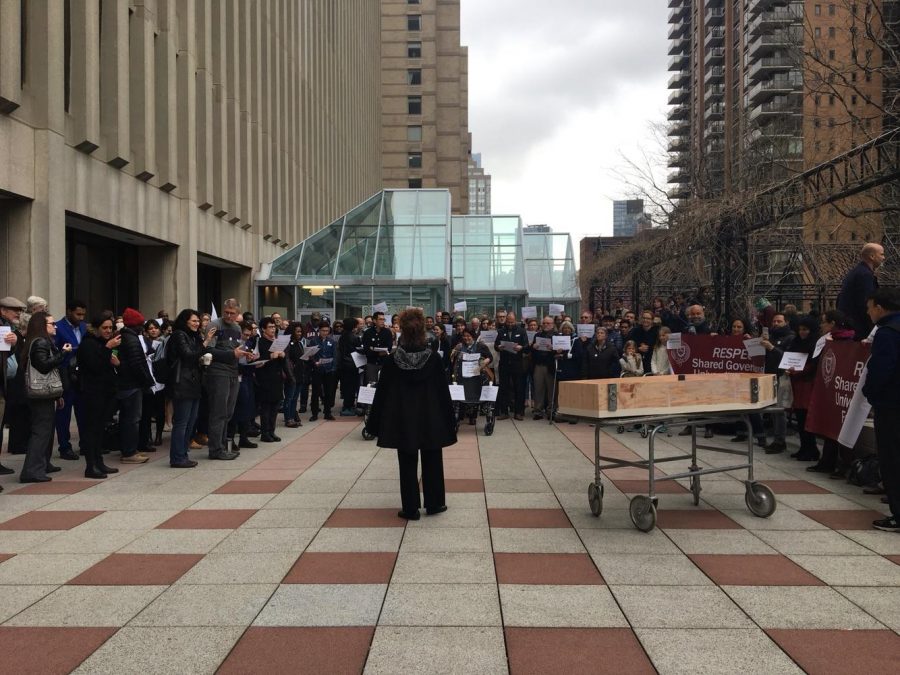
Faculty Pass Vote of No Confidence in McShane
Faculty staged a "sick-in" protest against the administration's health care proposals in April (Victor Ordonez/The Fordham Ram).
Faculty staged a "sick-in" protest against the administration's health care proposals in April (Victor Ordonez/The Fordham Ram).
April 19, 2017
Filed under Faculty & Administrative, News
Hang on for a minute...we're trying to find some more stories you might like.
Email This Story

Students and faculty held a “sick-in” at Lincoln Center before the results of the vote of no confidence were announced. (Victor Ordonez/The Fordham Ram)
By Victor Ordonez and Theresa Schliep
Fordham faculty passed a vote of no confidence in Rev. Joseph M. McShane, S.J., president of the university, on Wednesday. The Faculty Senate proposed the vote of no confidence on April 7 after unanimously deciding that the salary and benefits offer made by the administration was unacceptable. The vote comes a day before the Board of Trustees will convene to determine the 2017-18 budget.
Four hundred thirty-one faculty members voted they have no confidence in McShane, while 57 voted they are confident in his leadership, according to Anne Fernald, president of the Faculty Senate. Faculty completed the vote via an electronic ballot the Faculty Senate sent to 611 faculty members.
McShane sent a university-wide email out minutes after the results of the vote were released. He said while he is disappointed in the vote, he is still grateful for the contributions of Fordham’s faculty.
“In the twenty years that I have been honored to serve Fordham, I have always tried to be a strong advocate for and supporter of our faculty. Therefore, I was and am disappointed with the results of the faculty vote of no-confidence that I received from them. The outcome of the vote, however, in no way diminishes the high regard that I have for them, or the pride I have in all that they have achieved in their research. Nor does it lessen the gratitude that I have for the care they lavish on our students and the life-changing education that they give them, and the deep devotion that they have to the mission of the University.”
Andrew Clark, chair of the Faculty Salary and Benefits Committee, said it was a difficult decision.
“This was a very hard decision for everyone to make,” Clark. “People thought for a long time that they could restore faith to the [Fordham] community, but I don’t think that faith is there anymore. There has to be change.”
The vote comes after recent tensions regarding healthcare negotiations; un-imposed salary increases that the Senate says violates university statutes; and the university’s recent moves regarding adjunct faculty.
“This is not about an attack on an individual. It is an attack on a leadership role,” said Clark. “Many faculty members care deeply about Father McShane. This is not an attack against him, it is a critique of his leadership.”
The vote was meant to be “largely symbolic” since any change would require an action on behalf of the Board of Trustees, said Clark in a previous interview with The Ram.
However, upon hearing the results of the vote Clark clarified that “it is not merely symbolic. The board has a responsibility to the institution. This vote will have certain ramifications in respect to the board.”
The Board of Trustees sent an email out to the university community as well. It said it remains confident in McShane and his leadership in a resolution passed April 14, according to the email.
“Whereas the Board was disappointed to learn of the Faculty’s intention to conduct a vote of no confidence in our President in light of the University’s ongoing successes and current challenges, as well as the Administration’s efforts to negotiate with the Faculty to reach a timely compensation agreement,” said the board in the resolution. “Therefore, be it resolved that the Fordham University Board of Trustees today hereby affirms its full support of and confidence in the President and the Administration of Fordham University.”
Ahead of the vote, Clark helped to organize a faculty “sick-in” to protest the administration. At the protest, Clark said to the crowd “[faculty] will sue if we have to, and we need your help.”
It is currently unclear whether there will be litigations from the Faculty Senate as a result of the vote or the senate’s refusal to accept the most recent budgetary plan presented by the administration, according to Clark.
The vote comes one day before April 20, when the Board of Trustees meets to decide upon the budget for 2017-18. This budget will determine faculty pay and benefits, both of which faculty have found grievances with on behalf of the administration.
The Faculty Senate officially passed a motion on April 18 to accept the Faculty Salary and Benefit Committee’s recommendation to decline the 2017-18 budgetary plan offered by the administration.
Faculty members have opposed the administration’s plan to eliminate the UnitedHealthcare Enhanced and EPO Health Insurance Plans, which would force the 1,781 employees currently enrolled in these plans into either the Standard or HSA Plans, according to an email from the Faculty Senate and its legal counsel, Beth Margolis.
In a recent email from the Board of Trustees, the administration said that it has “been able to offer some of the best benefits in the city to our faculty and staff. According to Mercer, the global benefits consultancy, the health insurance package we offer our faculty and staff is more generous on average than those offered by Columbia University or NYU, and nearly twice as generous as other higher educational institutions nationwide offer their faculties and staffs.”
However, Marcia Flicker, associate professor of marketing and vice president of Fordham’s AAUP branch, said this comparison was misleading since Fordham faculty is not offered the same salary nor the same benefits as the institutions mentioned in the board’s email.
“The email comparison was disingenuous to say the least,” said Flicker. “The email comparison did not include total compensation for Fordham and neighboring universities when it specifically mentions schools like NYU and Columbia, it failed to account for the fact that their salaries are significantly higher than ours. They also offer subsidised faculty housing in Manhattan close to their campuses.”
Columbia University supplies its faculty with higher salaries than Fordham and discounted housing near its campus.
Update: 4/21/17
In a statement, the Board of Trustees said “the administration’s negotiating team has one week to find accommodation with the Faculty Senate’s Salary and Benefits committee, within the budget that the Board has approved.”

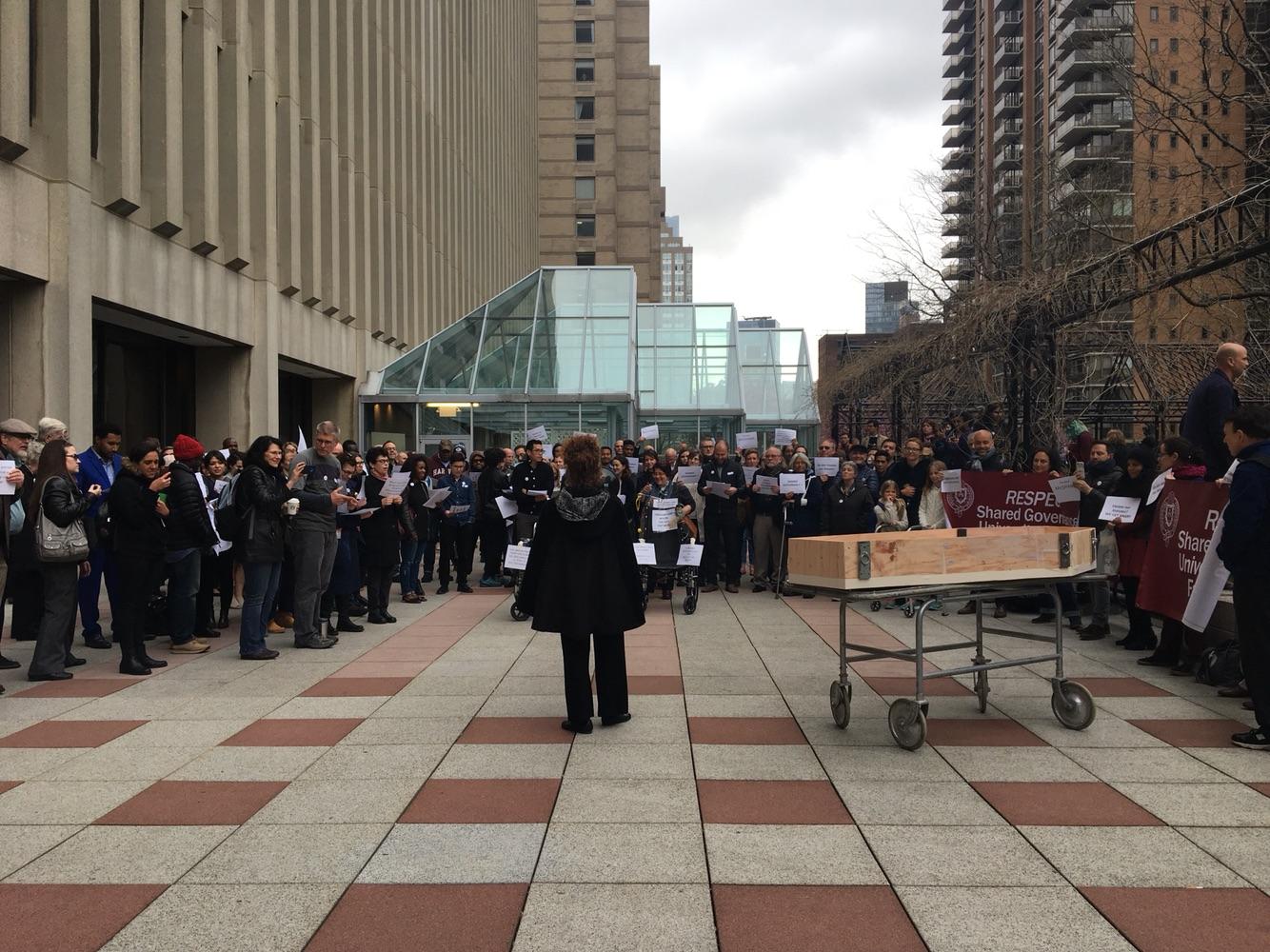
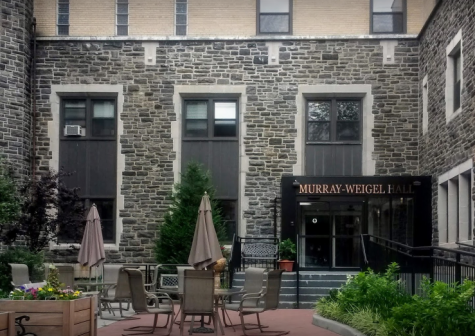

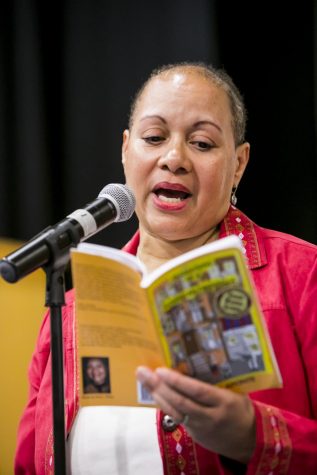
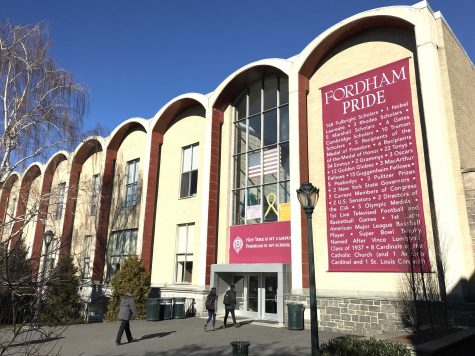
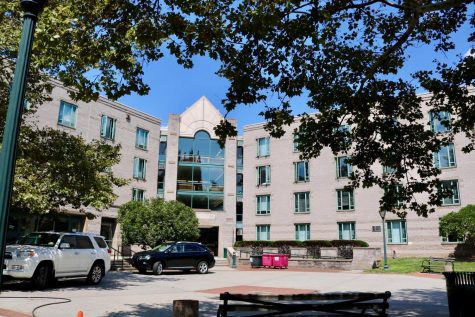
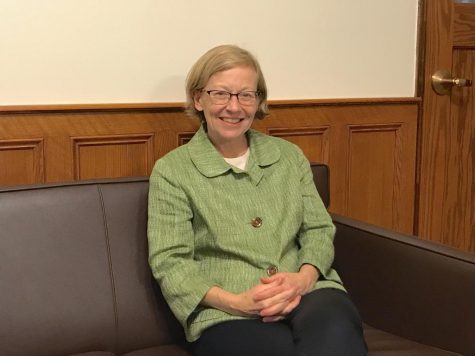
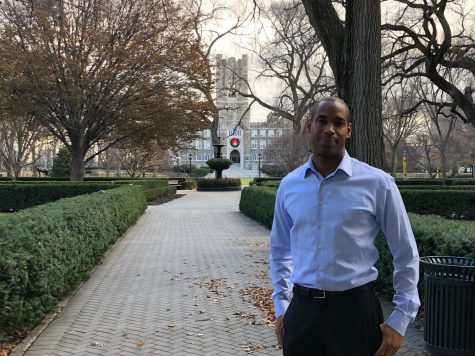
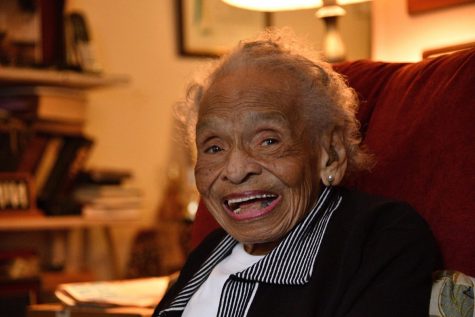
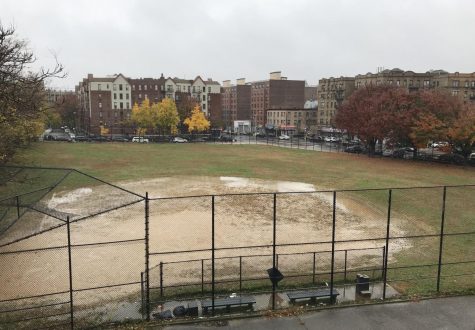
It’s time to move on from President McShane for a plethora of reasons, eventually no matter who you are you wear out your welcome. President McShane has employed a strategy of robbing Peter to pay Paul and he has buried the university in Jesuit overkill branding. The sciences at Fordham are woeful, graduate school is a mess and law is basically treading water with reduced enrolment. It has been all about Rose Hill and the undergrad. There have been improvements for sure but way too many opportunities missed. The worst part is that Fordham has a class structure and it is dysfunctional as heck, it is also divisive and caters to resident students paying way too much money for mediocrity.
The university could be so much more, Lincoln Center has been an underperforming asset for decades, imagine if Columbia or Stanford had that asset what they would do ! The reality of Fordham is that it is a 95% net tuition revenue based university, it does not have the money or wherewithal to understand how to properly grow. Fordham desperately needs a new president to reinvigorate the university and address issues, the trustees have to quit living in the past. A presidential search committee should be formed, one where a lay president is sought like what Georgetown did and Stephen Freedman removed from a ceremonial 500k a year position. Fordham constantly blowing the Jesuit horn gets old and frankly in the way of being a real university, it masks reality. The trustees have been hand picked minions that just rubber stamp in perpetuity, enough is enough! As one student wrote, ”I am tired of Fordham treating students like an ATM machine and faculty on Medicaid”. Fordham has been ripping off everyone while rearranging the deck chairs and embellishing with Jesuit greatness, no it is a university and people pay good money to learn, they want career preparedness or a competitive national brand. We are not Jesuit missionaries. Smart people ask questions, it took a long time for people to challenge the status quo, keep asking as there is much to learn !
Actions speak louder than words. McShane shows how “grateful for the contributions of Fordham’s faculty” he is by paying half of them poverty wages and telling them to go on Medicaid. #JesuitValues
As much as I agree with this cause, the data you linked in the last sentence of this article is not statistically significant. Two faculty members submitted their salary from Fordham, one did from NYU, and one did from Columbia. Why would you link to this as evidence for you claim that staff from NYU and Columbia have significantly higher salaries? This isn’t convincing and is simply poor journalism. I advise that you correct your article and substantiate your claims.
So I was curious and did some looking, and found the AAUP faculty compensation survey: https://www.insidehighered.com/aaup-compensation-survey . They don’t have data on NYU, but they do on Columbia and Fordham, and the numbers do seem to bear out. Here are average salaries, Columbia v. Fordham, for 2016-17:
Full prof: $224,400 v. $168,400
Assoc prof: $162,600 v. $115,600
Asst prof: $122,800 v. $98,700
If you look at average compensation (which includes benefits etc.) the numbers show the same basic pattern, but with even bigger discrepancies. From what I can tell, the data is voluntarily submitted by participating universities to the database. I’m not sure if it’s a different dataset than the one used by the Chronicle database.
Fordham University has blossomed magnificently over the past 20-years in Westchester and The Bronx … tuition is about the outer limit of what people can afford … a vote of this type is a betrayal. The tail hopes to wag the dog … the Board of Trustees is expected to “blink” in response. 😟
If they don’t like the benefits and/or salary, apply to Colombia than and see if you can get a job there.
To the guy above me stating Father Mcshane should be replaced, they are woefully misguided. Fordham has seen some of the largest numbers of applicants ever in the past couple of years. Fordham’s curriculum is constantly evolving and admissions are getting tighter. Fordham has a brand new, beautiful residence hall, a new business center, and is constantly expanding in many other directions. Every time someone recognizes Fordham in the workforce, do you know what the first comment is? “How great a Jesuit education is”.
Treating the kids like ATM’s is the cost of going to school in Manhattan. The majority of the kids at Fordham come from extremely financially stable backgrounds. If they wanted a cheaper school, they should have tried Ramapo.
While I agree that Fordham has been getting more competitive and the university has been doing a lot to up the aesthetics of their campuses, I think it’s faulty to just tell these professors “Well, just go apply to work at Columbia, then.” Columbia is one of the most prestigious universities in the world and undoubtedly has a highly, highly competitive application field. People need jobs no matter where they work and sometimes they don’t make the job cut in academic fields that are already competitive. Most of the professors I had at Fordham were Ivy educated and THEY don’t even work there. At the end of the day, people need to put food on their tables.
In reference to the name on your anon name: How are these professors and adjunct professors (who have the highest degrees in their fields) crybabies for trying to negotiate healthcare benefits, etc. with the university? Shouldn’t it be applauded that these issues are being brought to light so the university can improve for the sake of the students and the school as a whole (in your words: “expand in many other directions”)? Obviously, something is not working if a majority of the faculty voted that they have no confidence in McShane. What can be done to improve this disconnect between the two parties?
Also, honestly, Fordham is not that well-known in workforces outside of the Tri-state area (I am alum from out-of-state. No one recognizes Fordham when I mention it in conversation and I’m even originally from the East Coast). I’m not trying to discount your comment, rather I think that it would be a good approach to look at this situation from many different angles and perspectives in order to consider why this is all coming to fruition.
Would be nice if the college and other nonprofits voluntarily paid a portion of their revenue and income to the city.
They could not exist without the myriad of services received yet clearly dance around actual not perceived cotributiom.
The argument for reducing benefits and income in the current economic environment is strong most would not be compensated as well in the private sector
Dear Crybaby @ 12:32AM,
Shame on you for suggesting I am a “crybaby” because I fight for quality healthcare for my family? Shame on you for suggesting I am a “crybaby” because I hope that Fordham–which underpays me–can at least provide a health insurance package that does not require huge out of pocket expenses when my child is admitted to the hospital?
Shame on you for suggesting I am a “crybaby” because I want the administration to respect me enough to justify their position, to explain why they don’t have money to spend on health care? My guess—and this is just a guess, because the University refuses to share actual numbers—is that the University is saddled with debt from the “brand new, beautiful residence hall” you mention.
But the University will never admit that they made a mistake—it is easier to pass the debt on to faculty, and then call them “crybabies” when they start asking questions.
A. Professor
CORRECTED
Dear Crybaby at 12:32AM,
Shame on you for suggesting I am a “crybaby” because I fight for quality healthcare for my family. Shame on you for suggesting I am a “crybaby” because I hope that Fordham–which underpays me–can at least provide a health insurance package that does not require huge out of pocket expenses when my child is admitted to the hospital.
Shame on you for suggesting I am a “crybaby” because I want the administration to respect me enough to justify their position, to explain why they don’t have money to spend on health care. My guess—and this is just a guess, because the University refuses to share actual numbers—is that the University is saddled with debt from the “brand new, beautiful residence hall” you mention.
But the University will never admit that they made a mistake—it is easier to pass the expense on to faculty, and then call them “crybabies” when they start asking questions.
A. Professor
I can say with certainty that the bloated administration, which is coincidentally keeping spending transclusent, is where the money is being wasted. Many times did I wait in the administrative offices, watching people idly sitting around, smacking bubble gum, watching videos, and literally talking about how sweet of a gig it was.
If you want to get money back, look at those wastes of spaces in the administrative offices.
This is an extension of the ubiquitous movement to remove religious at the head of Catholic higher-education institutions. My alma mater, St. John’s, fell a couple of years ago. St. Joseph’s in Philadelphia was a recent victim. The perpetrators believe that, by eliminating the clergy, they can impose a secular regimoen pn the curriculum. I hope Father McShane stays and fights for what is rightfully his.
What the absolute hell would secularization have to do with teachers getting decent health care options and the salary they deserve? I love McShane dearly; my bosses went to Fordham and loved him then; I wish sometimes I had been married by him rather than the priest I had only because his talks persuaded me away from Pace and Fordham brought me and the husband together. But if he’s failed the faculty as a leader, he’s simply a bad leader. His position in the clergy has nothing to do with it, and shame on you for trying to correlate the two and downplaying the fact that hard working teachers can’t get affordable health care options. There IS no university without the teachers.
To the guy below defending Mcshane’s performance at Fordham:
1. Yes, Fordham has seen some of the largest numbers of applicants ever in the past couple of years, but this came at the result of one of the lowest yields rates of any college or university.
2. Fordham’s curriculum is constantly evolving, but in the wrong way. Over half the classes thought at Fordham are now taught by adjuncts. If I were paying 60K a year to attend, I would want to be taught by full faculty with top credentials.
3. “Treating the kids like ATM’s is the cost of going to school in Manhattan.” Is this a joke?
Dear George Cassidy,
No we are tired of obstinance, poor management, short sightedness and an overt and pervasive Jesuit message broadcasting throughout our education and degree. We get it that Fordham is Jesuit, however your order is not trained to manage or run a university in a very competitive world. Your order had slaves at one time, now they take advantage of a hard to get professor job by employing half the faculty as adjuncts and paying them paltry wages with zero benefits. We are tired of an opaque university that sweeps grotesque inefficiency under the carpet, a trustee board that is self picked to echo vagueness. Be lucky people attend, we are the paying customers and loyalty is not guaranteed rather it needs earned ! Fordham reaps of dysfunctionality and brutal misrepresentation, the swamp needs drained. Fordham is simply a story we have buy into and if questions get asked walls go up. New president please and not a Jesuit, time for a real university to transpire.
Fordham is a magnificent school and Father McShane is a wonderful leader whom I have great respect for.
It seems the faculty is upset over whether than have a EPO or “Standard” healthcare.
In the business sector, this would be a no brainer. Standard healthcare for all. Entitled professors who work 8 hours a week perhaps will have to pay a bit more if they want to see a specialist without a referral (that is the only difference between these plans).
While I would like to see Fordham pay their talent much better, I invite those disgruntled faculty members to go ahead and apply to teach at Columbia.
Fordham could certainly use some changes, but those begin with lowering tuition for ALL, and not raising it any further.
Fordham has lost its way.
Talk to most alums about what the tuition price is today and they will tell you it’s a “rip off”. Almost $70,000 all in, one of the most expensive schools in the country, with PATHETIC facilities for students and an embarrassment of a Division I basketball facility. People can’t believe the same administrators who were there 20-25 years ago are still there. Higher education is a competitive industry and Fordham is losing badly right now. Are there performance standards? Accountability for failing to hit those standards? Yearly employment goals? Performance reviews?
The admissions yield is an embarrassment – what is it, 10% or less? How many free applications and acceptances does Fordham have to hand out just to fill out a class? The cost, coupled with the low financial aid offers, are driving tons of qualified students to other universities.
What does the Board of Trustees actually do? Are they independent? Or are they “friends” with Fr. McShane and go along with whatever he says? They have a fiduciary duty to the university. The President of the university works for the Board, not the other way around. How does the Board view the Office of President? Is it just for fundraising? Or are you expected to have management and leadership skills?
The current state and perception of the university among alums and parents of prospective students as overpriced and not worth the money is going to take a huge effort to change. REAL CHANGE IS NEEDED.
Fordham has to figure out where it can be successful and focus entirely in those efforts; if that means cutting departments, shrinking enrollment, DO IT. Stop being obsessed with climbing the rankings ladder.
Get back to what made Fordham great — a superior education at an affordable cost to those who need it.
Put people on the Board who work at other universities and know how successful universities are run. Get a new President in here who has a plan and a vision for turning this university around. No more dead wood, no more being fat, happy and comfortable. Get uncomfortable and get a sense of urgency folks because this is a crisis right here.
At the end of the day President McShane is done as are the trustees, this is not going to blow over. When one googles Fordham the whole mess comes up, Faculty votes non confidence in President. A university cannot operate when it has lost the confidence of it’s faculty with such an overwhelming response, let alone it’s overall administration. The trustees have to recognize that these issues are not going away, they just can’t keep on raising tuition at an institution that ranks 60th. One where it’s graduate schools are not that great and doctoral work average at best. Fordham is way too heavily weighted on the likes of social work in perception. The planning committee is headed by a religion head, social work head and admissions head, what kind of university direction is that ? It is not in the growth educational fields and it is costing the school. On top of this Cuomo has delivered a free university education instate for lower middle income families, ironically Fordham actually fought it! This will directly impact intake especially at the commuter level. Why incur mountains of debt at a place like Fordham ? I can honestly say that in the graduate school of business case McShane cared less and basically destroyed Fordham’s MBA program is a brutally cavalier way (he drained the money out to Rose Hill). I sat through my graduation ceremony whereby McShane spoke about how we should treat our employees respectfully, this when most grads did not even have a job!
Fordham needs serious direction, McShane through sheer tenacity, theft of departmental budgets and revenue grew the undergrad, however a 9% acceptance yield just means Fordham gets way more applications however it is still a safety school, being overly religious also has a cost. Applications given the boom in overall university demographics was up everywhere. Fordham has never had it’s way, maybe in the 40’s -50’s but in the 70’s and 80’s it almost closed or sold and moved. Fordham needs to act like a real university, it needs to treat it’s students and alumni with respect (i.e. listen) and not just expect money. This situation is not going to be easy to fix given demographic trends, lack of decent facilities, average brand that in many cases is unknown. In order to grow it needs to be real and take it’s head out of the sand. The chummy mediocre administration/trustee relationship has to change 360, hire alum John Sexton short term to get some direction or have a presidential search. On top of all this Fordham is laying out big money on sports at a time when it the university is being stressed. This situation has been coming for a long time, it is now out in the open, it cannot be ignored any longer. Collectively we cannot accept the status quo any longer nor should we. McShane ran Fordham with admin from the likes of Fairfield, Gonzaga etc, that is his world, they were clueless as to how to grow to become a university that is sustainable for the future, much of the so called success was on the backs of others or programs. The latter has come home to roost, spin cannot fix this only new leadership and direction, frankly McShane has hung on too long.
As an incoming freshman, this is concerning. I chose Fordham because of the business school, campus, and internship connections, along with its reputation on the East coast. I had to turn down Boston College because of its price, and I hope that it is well worth it coming to Fordham. It is worrying me to hear of all this conflict between faculty and trustees. Everyone has been saying how great of a school Fordham is, and Fordham is always boasting about how much it has improved in rankings and reputation recently. How is a university supposed to break into the top 50 or become one of the “prestigious” catholic colleges when there is this much conflict in the administration? It can’t. I hope they get it together because it is making me question what Fordham is all about.
I concur with pretty much all that is said here, there are the rabid Fordhamites that would follow McShane over a cliff, they are cult like. There is a culture of crookedness at Fordham that needs completely destroyed, if it is raining out they will spin that it is breaking sunshine. The administration cannot see the forrest for the trees because they have been around so long, the tried and true strategy is always just wait for the malcontents to graduate. Attending Fordham is akin to suffering third world type management, we all see the blunders, apathy and outright stupidity of our admin. Quite frankly most admin are lucky to have a job, one former senior admin official used to say ”if I took Fordham seriously I would commit suicide”. As someone aptly put it, McShane should report to the trustees not the other way around. The trustees are just puppets, they are picked to be maleable and not to ask too in-depth a question and to overlook everything. As another official said when describing one faculty dean’s report to the trustees, ” she just said admissions is up by x amount (no consideration of quality of applications) and then they broke for drinks.
Fordham has improved substantially under McShane at a big cost to the other faculties including law, it used to be the Joey’s of the world and the bridge and tunnel crowd meets Long Island at Fordham. It still is a bit like that but now they are from Connecticut. Fordham is way too parochial in nature and brutally focused on undergraduate studies. This is where McShane really erred never mind missing most of NYC’s tech boom. He did his schtick and now it is time to get real, CUSP if anyone has read it is a road to nowhere. Fordham has to lose it’s current administration as well, they simply are not qualified in many circumstances to be making 350k a year. In order for real change the tail wagging the dog act has to change, we need real trustees that are not just compliant. We need to lose the culture of collusion and nepotism throughout, deans being appointed without a search, hiring just from small Jesuit programs as opposed to say NYU. Let’s move on an get a president to build a university that is inclusive, accountable and growing in disciplines that have merit to today’s economy. To date it has been about a Rose Hill experience, Mugsy’s etc and then grad on the lawn, let’s hire from Columbia, NYU and break the wasted model of mediocrity meets.
To those faculty that compare salaries with NYU and Columbia, well there is a reason you are teaching at Fordham, most would not be hired there. The facts on the ground are that a 50% adjunct rotating faculty is community college, hence Fordham is ripping everyone off and simply selling a story. The gig is up, we are so on to it now, we need someone who has run a real university not Scranton or Loyola. Fordham needs to take a break from ranting about social justice because only a few want to pay to hear it or take a class about it. When community college has better programs and is free it is going to spell the deathbed for Fordham, it is time to wakeup and effect the changes required to survive.
”In a statement, the Board of Trustees said “the administration’s negotiating team has one week to find accommodation with the Faculty Senate’s Salary and Benefits committee, within the budget that the Board has approved.” Fordham has survived financially by ripping these people off, where is this budget money going to come from? What they will do is settle on health benefits for the faculty, the adjuncts getting a raise will be deferred. At the end of the day having more than half the faculty teaching as serf like adjuncts is deceitful for 47k a year tuition even if discounted ! Let’s be honest, students don’t wakeup to this until too late to figure they are getting the wool pulled over them, Fordham survives on this economic model of exploitation it will not change.
This is stupid.
If you want higher wages, go to Columbia. If you care about the values of a Jesuit education, and want to make difference in a young man or women’s life, stay put. To have 600+ people vote as “no confidence”, they must never had lived a day in McShane’s shoes.
Uphold the mission. Stay strong for the students. Deliver to the community.
If you want better wages, leave. I know a lot of great teachers looking for a $40k-100k+ job, regardless of geography. Empassioned educators lead to empassioned students. Which leads to engaged alumni.
A vote of no confidence means McShane hasn’t advanced the University. Look at the maps of campus, and the student base and their starting salaries, and you mke
the decision.
Once more the ol maroon,waves on high…..
We Do, or Die.
Dear Felix and Debbie,
1. Felix, Please stop pitting students against faculty. I can care about students—and I do very much—and still want adequate health care for my family. I dedicated over a decade into this University, and its students. I am not going anywhere.
2. Debbie, Yes, you are correct, this is about McShane–but only about his abilities as a leader (he can be a good person, and a poor leader). It was the hardest vote many of us ever cast, because we do care about Father McShane as a person.
A leader would have pulled all sides together and worked to find a solution. Instead, he was absent. Absence is not leadership. Hence the vote of 88% no confidence.
I pray an agreement can still happen. Father McShane should view the vote as an opportunity to change his approach and get actively involved in the negotiations.
So it is once again about the money.
Sacrificing an outstanding man,mentor and leader to line their pockets.
How dare they say this is not about Father McShane!
I do not see a vote of no confidence in the Budget Department!
As part of a Third Generation Legacy family I am appalled.
A very sad day for Fordham University.
Debbie, Felix,
I honestly do not care about ”Jesuit values” rather I care about having a decent and known degree, one with value in the marketplace. Frankly I think these rabid McShane supporters are lunatics, one only need look at the financials of the university, it is going nowhere. Jesuit values I have seen are; ripping off students, masquerading a university when it is really a small parochial college, outright lying to name a few. People have to accept that many do not buy into the whole McShane mantra and it has become over the top. Social Justice is now the candy floss to cover up what is not happening at Fordham, we just have to play along with McShane, Fordham in his mind should be like Cuba. I will state unequivocally that change is needed in all aspects, none more than the leadership and administration. What does Stephen Freedman actually do for example ? Frankly I find it brutally offensive those that put this blowup this Jesuit stuff way over my degree which is seriously diminished now.
The university is controlled by Rose Hill neophyte students when in fact there are two campuses. Talk to anyone at the law school, we know that Law’s tuition gets redirected to support whatever is going on at Rose Hill ! My law degree ranking has gone nowhere, in fact it has fallen to 10 places since 1998. The graduate schools are a mess and many are not making budget. The acid test for any university is it’s graduate schools and research not undergrad. This is why Fordham is just a parochial college! I honestly do not care about social work etc, I paid serious money for a degree and I am not in the charity business. I am Catholic, went to elementary and high school in the system, that said I don’t follow blindly and that is what McShane requires. He has lost his way long ago and is in over his head quite frankly. He has not tapped into all NYC’s potential, his hires are mediocre which furthers mediocrity. Fordham can do allot better, it needs to raise the bar in hiring and retire those not achieving, McShane can find other things to do but he is wasting a school now.
If I could return my degree from Fordham and get my money back I would be quite happy, frankly I view the institution as somewhat less than upfront with morals, this while flogging them in perpetuity. Fordham is an institutional hypocrite. When one goes to the like of NYU or to U Wisconsin etc you get a real university and education. Real universities are not continually cutting corners, creating machinations and importantly they are accountable to the students and their boards are not play along types. Fordham’s administration is tier four Soviet like and let’s not even talk about the appointed minions as trustees! Sorry I did not sign up for the Catholic version of Billy Graham meets Sears like management. I fully agree with the commentary below that it is time for a president search and a serious shaking of the tree !
Dear Ramsters,
It is unfortunate that we have to put up with nuts like the person who wrote this madness below, and it is madness! He must be from Fordham Prep, for sure let’s just find people to exploit for the greater good of god and Fordham ! McShane no mas ! Fordham has been running a mini Ponzi scheme with 50% adjuncts teaching, sort of like substitute teachers running an expensive private high school. Fordham has a 9% acceptance yield for a reason, students want a quality education for a decent price at a known national brand or they get way better financial aid. Fordham’s revenue sources are simply tuition and dorms. It saves massively on expenses by hiring temporary adjuncts to teach for busboy wages. Also the undergrad Jesuit educators are essentially working for free having taken a vow of poverty. Where is the money coming from budget wise for the rebuilt football program for one ? The basketball team gets their degrees now in three years, the mens coach is paid what a new president should get and all we do is lose!
Honestly I think the days of all these Catholic colleges are nearing an end, there should be consolidation. Fordham should merge with Manhattan for one, at least Manhattan has an engineering program. Fordham is in perpetual faking it mode, anyone questioning what is going on gets silenced or intimidated. Security at Fordham has a ominous feel with all these ex. NYPD types cow towing to the president.
If Fordham wants to start getting real show where the revenue is coming from department wise, let’s see where the money comes in and goes !!
This diatribe below is offensive to say the least, sheer lunacy when we seek sanity and clarity, certain people want to live in the past and hate questions !
”Uphold the mission. Stay strong for the students. Deliver to the community.
If you want better wages, leave. I know a lot of great teachers looking for a $40k-100k+ job, regardless of geography. Empassioned educators lead to empassioned students. Which leads to engaged alumni.
A vote of no confidence means McShane hasn’t advanced the University. Look at the maps of campus, and the student base and their starting salaries, and you mke
the decision.
Once more the ol maroon,waves on high…..
We Do, or Die”.
Tuition at Fordham keeps going up each year, so the quality should go up as well. Not so apparently! Look at all the adjuncts running around campus teaching (apparently) upwards of half the classes, some of whom are grad students without PhDs. If students wanted to be taught by grad student, they would save the 50K and go to their local community college! This whole adjunct/faculty dispute incident has exposed something very unpleasant about the educational approach at Fordham under McShane. Paying top dollar for an education they could get basically for free (Thanks to Cuomo, ironically a FU grad).
The Jesuits are great con men, they act out a role while stealing your money and delivering a constant sermon, one you could get for free at church instead of a real education. The Core suits them as they can lay in fluff that saves money. John C. nails it, Fordham’s days of quietly stealing your money are nearing an end, parents should wake up to Cuomo’s deal being offered. People pay to get an academic education not morality forced upon them while someone is picking their pocket. Someone tell me what the heck is a Jesuit education and what makes them so great ? I look around and the classrooms are from the 40’s, Go Rams should mean wake up and ask questions ! The faculty adjunct issue gets to the core of a university, the quality of teaching is what makes a great university. If 50% of Harvard’s faculty were adjuncts I doubt it would have any prestige, especially if they are teaching at LIU on the side with no doctorate, Fordham New York’s Jesuit University needs investigated, while nowhere near as bad as Trump University it has a similar deceitful style.
This also is a large farce, a planning committee gamed by McShane https://fordhamram.com/2016/04/06/university-strategic-plan-drafted-released/ .CUSP says they want to expand STEM yet there is no representation from anyone in science on the committee. The committee is steered by department heads from religion, social services and enrolment. This in my opinion is grounds to have McShane removed, he has manipulated academic planning to align with his social justice initiatives which are all encompassing, why should people pay huge money to learn morals (parents teach it for free) ? For another why would anyone study religion or social work for 45k a year. Also education, you can take it for much cheaper at a state school, it is all about getting a teaching certificate.
Fordham does not care if students leave with massive debt or that they have stripped parents of hard earned college savings for things that cost much less elsewhere, or that adjuncts have actually been teaching your kid. The grounds are nice and fool the parents but so is the Botanical Garden and one can simply buy a membership, what is desperately needed is facilities plus other programs developed other than arts. Sell Lowenstein and build in the Bronx ! Time is not on Fordham’s side here, it needs to act and get it’s management structure replaced, dormancy and a wink wink everything is ok facade doesn’t cut it anymore, we have watched that movie for too long. Sorry to all the Jesuit lovers here but your hiding reality is no longer accepted.
I think this issue is one of many that has sunk the president, freedom of speech and assembly at Fordham is not a right and they cherry pick who has that right. The Palestinian group denial was outrageous, I am sure the president and the administration had their finger in that one. https://www.nytimes.com/2017/04/24/opinion/what-liberal-snowflakes-get-right-about-free-speech.html . We must always be challenging what many believe to be our birthright as a nation. Keep on asking good questions, it is your money and degree not theirs !
Find Fordham on this 2017 ranking of all colleges and universities in the US, hint beaten by Loyola Marymount University in LA. https://www.timeshighereducation.com/rankings/united-states/2017#!/page/7/length/25/sort_by/rank/sort_order/asc/cols/stats
Message to the Chair of the Board of Trustees:
I got your email. Everything is not great at Fordham. Fordham is not progressing — it is losing ground as compared to its peer and aspirant group. You need to cut tuition, not just think about ways to not increase it.
I think you understand now that a lot of people don’t believe that the academic offerings and the facilities make Fordham worth the money it is charging. Does the Board have any plans to address the 9% yield?
I have donated to the university regularly since I graduated. I will not be donating any longer until I see the Board take concrete steps to improve the experience for the students. A new influx of talent and leadership is needed across the board, notably the Board of Trustees, including getting people involved who have experience running universities.
Why is it that everything is always so difficult at Fordham ? My recommendation for any future student is to go to a known entity, one that is recognizable throughout the world. Also, one with a strong endowment that can support research and expansion and you are not guilted every minute of the day to give. Meritocracy is great but be intuitive in one’s choices. Fordham needs to get it’s act together, how hard is it for the president to step down after 14 years so we can all move on ! The administration and trustees are doing what they do best, that is circling the wagons and trying to wait us out.
Thanks Randall for that ranking, my lord we are ranked #196 when they throw in all the colleges. I honestly do not think that Fordham gets it, they rely solely on the US News ranking while others like Times Learning and the WSJ are extremely important. Good schools have consistent rankings regardless of what ranking they appear in, Fordham not. It is like whipping a dead horse when one comes to the administration, there is so much one see’s that could be improved. Often sheer lower admin laziness is what it is all about. President McShane is accountable for what goes on, having losers going thru the motions of their jobs cost us all in the long term. Too many basic staff are from the Bronx and do not give a rats ass about anything other than 9-5, they actually hate us yet we pay their salaries. There needs to be a full time ranking committee that looks after ALL the rankings, they need to monitor and submit on a timely basis. Much of Fordham’s admin staff have a horrible attitude, McShane has allowed this culture to exist way beyond what any president should allow. He needs removed as he is not really running the university rather just fundraising, his underling Freedman is lost in the Bronx and has added nothing to Fordham other than photo ops.
From article, ”However, Marcia Flicker, associate professor of marketing and vice president of Fordham’s AAUP branch, said this comparison was misleading since Fordham faculty is not offered the same salary nor the same benefits as the institutions mentioned in the board’s email”. Whoa when I saw Flicker’s name I went into convulsions, having briefly had her class and escaped she is lucky to be working let alone be at Fordham, why would anyone ever offer her the same salary as Columbia ? Her PHD in marketing is from Wharton, however one would think she would be at a place like Columbia or be department head until you get her and it. Say no more (see Rate My Professor), however I will attest that GSB’s marketing department is on par with Pace’s and not much will change and this is a huge ongoing problem with Fordham. Adjuncts to deadwood going thru the motions, finding a star prof is a huge challenge given what we pay. It seems Flicker is spending more time complaining as opposed to researching which is scary stuff at GSB. She came on faculty decades ago with a Wharton PHD and is still an associate professor, say no more.
[…] including Catholic clergy and professors, and over 100 Fordham professors. Last week, faculty voted no confidence in the leadership of Fordham President Rev. Joseph M. McShane by a margin of 431 to […]